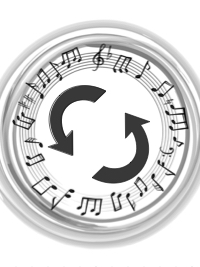Creative Lyric Writing Secrets: When Simple Repetition Is Not Enough

"Burn baby, Burn!"
Do you find that your lyric writing lacks in energy? When you write songs your lyrics are "stiff" and "cold"? Would you like to find a way to "turn the heat on"? It's not as hard as you may think
As we have seen previously, the problem with songwriting is that it is completely different than writing prose or essays (which is what your English teacher focused on). As such, unless we make a specific effort to "correct" that previous knowledge, our lyrics will sound "weird" or "unusual" - and you may have noticed that in your own songs.
But don't worry, because it is not difficult to learn how to correct the influence of your essay-writing days: after all you DO listen to songs every day, you just need to be reminded of the difference between written language, spoken language and "sung language" :-)
We have seen in a past article that most songwriters neglect to use repeated words in their lyrics, and how to use immediate repetition to increase the intensity of lyrics. But sometimes this is not enough... sometimes you need DELAYED repetition - that is much stronger.
Just listing all the rhetorical figures that have something to do with delayed repetition will take way more space than we have here, so today we'll focus on ONE strategy for repeat words and we are going to see 3 possible variants of it. This strategy is called "Diacope" ("cut in two" in Greek - again, I do not make the names...)
Basic Diacope
The basic Diacope is simply repeating a word or phrase with something else in between. Some of the most famous literary quotes are Diacopes: "to be or not to be". The words "to be" are repeated, with "or not" in between. The structure of the quote is ABA, with A = "to be" and B = "or not".
Another ultra-famous quote with a Diacope is: "Bond. James Bond". In fact, if you think a few minutes you'll find MANY more.
So it's used a lot in literature. But in songwriting? If you turn on the radio right now you will hear a Diacope in few minutes. Just to prove my own point I just did the same... and they were playing "Sunday Bloody Sunday" by the U2. Which made me remember: song titles that use Diacopes are more memorable, so make sure you use it for your hit songs.
(Everybody can talk in Diacope, everybody can. It's madness, I tell you, madness!)
Elaborating Diacope
"Coast to coast" is a Basic Diacope, as described above. It's good, short, memorable. But sometimes it's not enough: you also want something that builds up, you want a crescendo in intensity in your lyrics to match the crescendo in your music.
This is where the Elaborating Diacope comes to the rescue: you can attach an adjective to the second to give the sense of increasing intensity. The textbook example is "from sea to shining sea" from the song "America the beautiful"
It's easy, I tell you, it's incredibly easy to learn how to use Elaborating Diacopes
Extended Diacope
Now, if you want something even stronger, we can pile up repetitions. Diacope is ABA, the Extended Diacope is AABA. Seems to obvious? Since today I'm on a Shakespeare roll, let, me put these quotes here: "A horse! A horse! My kingdom for a horse!" and "Romeo, Romeo, wherefore art thou Romeo?"
Do you notice how they roll on the tongue?
But what about songwriting? Well, ever heard that song that goes "Love me, love me, say that you love me"? (Lovefool by The Cardigans). The rest of the chorus contains other Extended Diacopes and it's all these repetitions that actually make the song.
What Now?
You gotta train, man, you just gotta train using Diacopes every time you talk. Ok, maybe not EVERY time, but try to build some sentences using it and see what you can do. Soon your lyrical ear will "get" the sound of the repetitions and then you will be using it naturally in your songs. Remember: training, training, and then some more training :-)
And in case you find your creative juices drying up... learn here how to have them flow again and destroy song writer's block